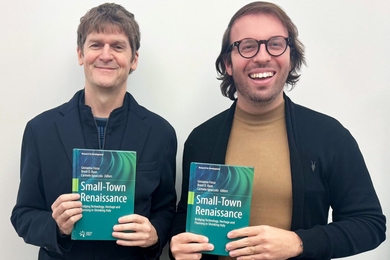Dr. Phillip Sharp, director of the McGovern Institute for Brain Research, has announced the appointment of three senior investigators to the institute. All are faculty members in MIT's in the Department of Brain and Cognitive Sciences (BCS).
Ann Graybiel, the Walter A. Rosenblith Professor of Neuroscience, is a member of the National Academy of Sciences and the Institute ofMedicine. She studies the neurophysiology of a brain region that is implicated in the control of movement and cognition, as well as in our ability to learn habits. Disorders in this region have been implicated in Parkinson's and Huntington's diseases, and in neuropsychiatric disorders such as Tourette's syndrome, obsessive-compulsive disorder and addiction.
Emilio Bizzi is the Eugene McDermott Professor in the Brain Sciences and Human Behavior in BCS, which he chaired from 1986 to 1997. He is a member of the National Academy of Sciences. Dr. Bizzi's work focuses on how the central nervous system translates brain messages signaling motor intent into muscle activation. He recently discovered that the spinal cord contains a map of limb postures that is key to this transformation.
Nancy Kanwisher is an associate professor in BCS. She studies human visual perception and cognition, using functional magnetic resonance imaging to look at brain activity in people as they carry out visual tasks. Her work focuses on understanding the neural and cognitive mechanisms underlying object recognition and other aspects of visual cognition. She has identified several regions of the brain that play spe- cialized roles in the perception of specific categories of visual stimuli such as faces and places.
These three faculty members join Tomaso Poggio, the Uncas and Helen Whitaker Professor in BCS and in the Artificial Intelligence Laboratory. Dr. Poggio is also co-director of the Center for Biological and Computational Learning and was appointed an investigator immediately after the establishment of the institute. He is a computational neuroscientist whose recent work focuses on the process by which the brain learns to recognize and categorize objects. His work is important not only towards understanding higher brain function, but also for its applications to computer learning.
The McGovern Institute for Brain Research was made possible by a gift of $350 million from International Data Group founder and chairman Patrick J. McGovern Jr. and his wife, entrepreneur Lore Harp McGovern (MIT Tech Talk, March 1, 2000). A building to house the institute is currently in the planning stages. The new institute's mission is to investigate the biological basis of human higher brain function, using a multidisciplinary approach that includes applied physics, engineering, computer science, computational neuroscience and cognitive psychology in addition to biological sciences. It is anticipated that the McGovern Institute will ultimately have 16 investigators with primary appointments in multiple departments.
A version of this article appeared in MIT Tech Talk on February 28, 2001.





